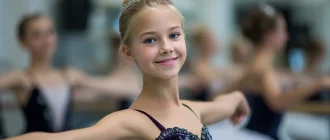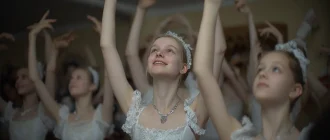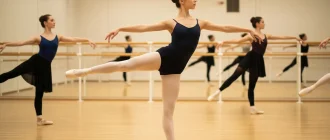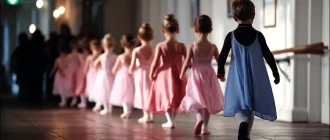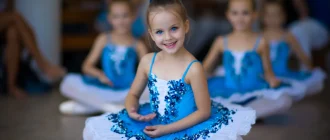Ballet Teachers as Mentors: Nurturing Passion, Discipline, and Artistry
Ballet can look super graceful from the outside. The flawless pirouettes, the elegant lines, the sparkly costumes — it all seems magical. But anyone who has ever stepped into a dance studio knows the truth. Behind every beautiful performance are sore muscles, long hours, and a lot of hard work. And right at the center of all that? Ballet teachers.
But they are not just there to shout “point your toes” or “again, from the top.” Ballet teachers often become much more than instructors. They become true mentors. The kind who shape not just your dancing. It’s all about your mindset, your confidence, and sometimes even your life’s path. Let’s dig a bit deeper and shed some light on how ballet teachers play such a significant mentorship role.
How do they help dancers stay passionate, build discipline, and grow into true artists? Whether you are a dancer, one looking for ballet teacher jobs on Jooble, or just curious, stick around; there is a lot to learn here.
True Mentors Podcast
Keeping the Passion Alive
Okay, yes, teaching technique is a big part of the job. You have got to know how to tendu, plié, and pirouette correctly. No one is denying that fact. However, great ballet teachers do not just teach how to move; they teach why it matters and show the right attitude. They are the ones who take a boring combo at the barre and turn it into something meaningful.
They remind dancers that every tiny movement contributes to a bigger picture — to storytelling, to emotion, to art. Technique is the structure, sure. But artistry? That is where the real magic happens. And it is often a teacher who helps bring that out.
Not every day in the studio is sunshine and perfect pirouettes. Some days you are tired. Some days, your body does not cooperate. Some days, you wonder if you are even cut out for this. And this is exactly when a mentor makes a difference. Ballet teachers who are true mentors know how to keep the fire going, even on the tough days.
Sometimes it is a pep talk. Sometimes it is just a knowing look that says, “I get it. You are doing fine. Keep going.” At other times, it reminds dancers of how far they have come, even when progress feels slow. That kind of support is everything because staying passionate when things are hard is what separates dancers who burn out from those who break through.
Discipline: The Not-So-Secret Sauce
Let’s talk about discipline — not the scary, bootcamp kind, but the kind that helps you show up again and again, even when it is hard. Ballet teaches discipline like nothing else. Early mornings, repetitive drills, constant corrections — it is a grind. But it is also where real growth happens. And guess who sets the tone for that kind of dedication? Yes, it is your teacher.
They are not just telling you to work hard for fun. They have been there. They know what it takes to improve, and they are helping you build habits that stick with you long after the music stops. And honestly, learning how to be consistent, focused, and patient? That stuff pays off in every area of life.
Teaching the Artist, Not Just the Dancer
Ballet is not just about being technically perfect. Of course, clean lines and strong feet matter. However, it is the emotion behind the movement that evokes a sense of feeling in people. Great teachers know this. They will ask questions. So, you will often hear:
- “What is the story behind this variation?”
- “How does this movement make you feel?”
- “Can you dance this as if you were telling someone a secret?”
This is where mentorship plays a significant role. These teachers are not just trying to produce cookie-cutter dancers. They are helping you find your voice through movement. They want you to be an artist, not just a technician. That is what makes performances unforgettable — when dancers stop performing and start expressing.
Some ballet teachers are super tough. They give sharp corrections. They have high standards. And sometimes, it stings. But here is the thing: that kind of tough love usually comes from a place of belief. They see your potential, even when you do not. And they are not afraid to push you toward it.

There is a big difference between criticism and coaching. When a teacher corrects you with intention and care, that is mentorship. And if you know they have your back, those tough moments feel more like fuel than failure.
Ballet is not a short-term thing. It takes years (sometimes decades) to grow as a dancer. That means ballet teachers often become an integral part of someone’s life for a long time. And when you spend that many hours in the studio together, it is more than just a teacher-student thing. They see you go through injuries, growth spurts, confidence dips, and life changes. A good mentor becomes a steady presence through it all. And that kind of relationship? It lasts. Ask any dancer. They probably still remember the teacher who had the most significant impact on their journey.
The Little Things Matter
Sometimes it is not the big corrections or speeches that stick with students. It is the small stuff. A compliment after a hard combo. A smile when you finally get a tricky step. A simple “I’m proud of you.” Here are a few things students pick up just by watching their teacher:
- How to treat musicians and classmates with respect
- How to handle failure without crumbling
- How to celebrate small wins
- How to stay calm under pressure
- How to keep showing up — even on off days
These are not just dance lessons. They are life lessons. And great mentors teach them without even trying.
Creating a Space That Feels Safe and Supportive
Ballet studios can sometimes feel intimidating. All those mirrors create the pressure to be perfect. But a good teacher can shift the entire vibe. They make a space where mistakes are part of the learning process, not something to be ashamed of, where questions are welcomed. Where every dancer, no matter their level, feels like they belong. When students feel safe, they are way more likely to take risks, and that is where real progress happens.
Knowing When to Push and When to Ease Up
Mentorship is not one-size-fits-all. Some days, a dancer needs to be pushed. Other days, they are close to burnout and need a break. Experienced teachers can tell the difference. They are like dance whisperers. They can sense the mood of the room and the energy of the student, and adjust accordingly. Finding that balance between challenge and care is what makes a teacher a true mentor. They do not just follow a script; they meet you where you are.
Life Lessons That Stick (Even Offstage)
Here is a fun little truth: a lot of what ballet teachers teach has nothing to do with dance. Seriously. You might spend years training and never become a professional. That is okay because what you will take with you is:
- How to work hard even when it’s not glamorous
- How to handle constructive criticism like a boss
- How to push through tough moments with grace
- How to support the people around you
- How to believe in yourself — even when it’s hard
That is the kind of mentorship that endures. That sticks with you for life.
From Student to Mentor: Paying It Forward
The mentorship cycle does not stop with your teacher. As dancers mature, they often find themselves becoming mentors, sometimes without even realizing it. Maybe you are the one helping a younger student with their recital choreography. Maybe someone asks you for advice about auditions or pointe shoes. Or perhaps you offer a kind word when someone is having a rough day.

That stuff matters. You don’t need to be a professional or have 10+ years of teaching experience under your belt to make a difference in someone’s journey. Becoming a mentor does not mean you have all the answers. It just means you are willing to share what you have learned, be supportive, and help create the kind of dance space you wish you’d had when you were starting. This is how you can be a mentor in the studio:
- Offer help to new or nervous dancers without being bossy
- Celebrate others’ wins
- Share your struggles so others feel less alone
- Be approachable and kind
- Respect everyone’s journey, no matter their level
And who knows? Someday, someone might say you were the person who helped them stick with dance when they were ready to give up.
One Mentor Can Change Everything
Dancers do not remember the perfect pirouette or the exact steps to a combo from five years ago. What they remember is how their teacher made them feel. They remember the teacher who believed in them, the one who gave them a shot, the one who showed up, day after day, and helped them grow into something more. That is what we call mentorship. And it is what makes ballet teachers so incredibly special.
Ballet teachers do so much more than teach steps. They challenge, encourage, support, and inspire. They help dancers find their confidence, develop their discipline, and unlock their artistry. And often, they become mentors who leave a lasting mark.
If you are lucky enough to have a teacher like that, hold onto them. Thank them. Learn everything you can from them — on and off the floor. Because mentors like that? They are rare. And they are worth celebrating.
FAQ
What’s the difference between a ballet teacher and a ballet mentor?
A teacher provides corrections and helps you improve your technique. A mentor does all that and supports your personal growth. They guide you through challenges, celebrate your wins, and help you find your unique voice as a dancer.
Can strict teachers still be good mentors?
Of course. Some of the best mentors are the ones who are tough. However, it is also important for them to be fair, supportive, and respectful. It is all about intention. If they push you because they believe in you, that is mentorship.
Do you need to be a professional dancer to benefit from a ballet mentor?
Nope! Mentorship is not just for people going pro. Anyone who loves ballet (whether it is their hobby or their dream job) can grow from having a teacher who supports and challenges them in a meaningful way.
How can I tell if my ballet teacher is a good mentor?
A strong mentor does not just focus on technique. Instead, they see you as a whole person. They should encourage you, give you honest feedback, listen to your goals, and help you grow.
What should I do if I don’t feel supported by my ballet teacher?
If you are feeling unsupported or constantly discouraged, it’s perfectly okay to speak up. Share how you are feeling. Sometimes they do not even realize it. If things do not improve, it is OK to look for another teacher who better matches your needs.
Can older dancers or peers also serve as mentors?
Mentorship does not always have to come from the person in charge. Sometimes older dancers, studio assistants, or even classmates can be amazing mentors. If they inspire you, offer advice, and cheer you on, that is mentorship, too.



